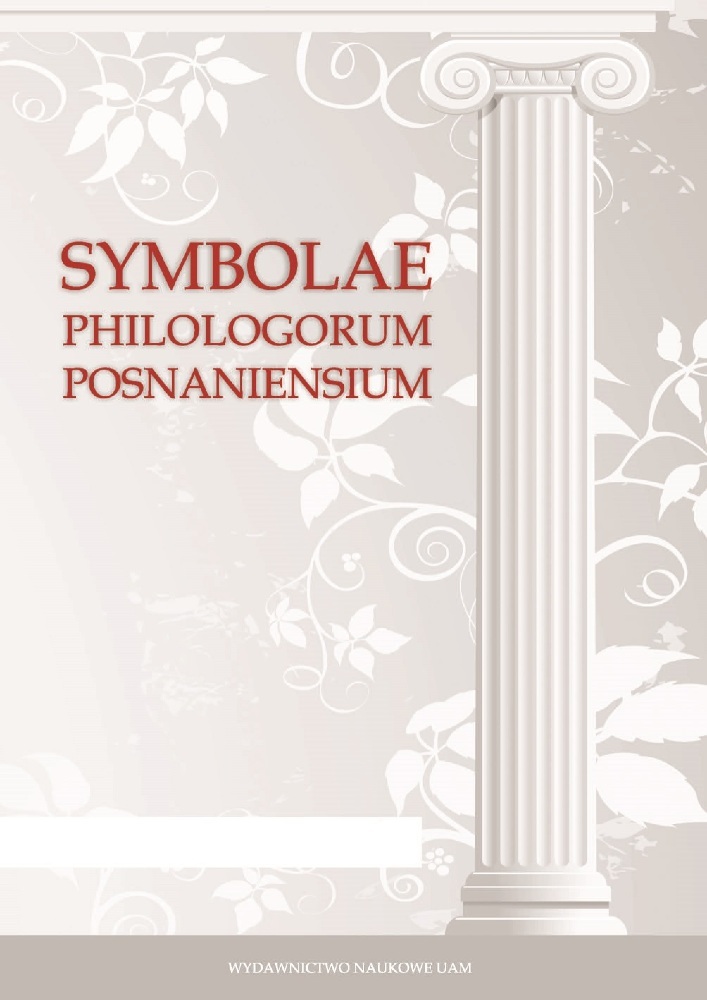Abstrakt
Alexander Pushkin knew what he shared with Ovid. Both were exiled, having enjoyed a splendid life, both were highly gifted, and not too shy of erotic adventures – of which they speak amply in their poetry. The Russian formalist Tynyanov pointed at such similarities, inventing the literary genre of ‘docufiction’.
Bibliografia
Erlich 1965: Erlich, V. 1965. Russian Formalism: History – Doctrine. London (second revised edition).
Golla 2017: Golla, R. (ed.). 2017. Conversations with Vladimir Nabokov. Jackson.
Grabes 1975: Grabes, H. 1975. Erfundene Biographien: Vladimir Nabokovs englische Romane. Tübingen.
Greenleaf 1994: Greenleaf, M. 1994. Pushkin and Romantic Fashion: Fragment, Elegy, Orient, Irony. Stanford.
Guégan 2013: Guégan, G. 2013. Appelle-moi Stendhal. Paris.
Lotman 1989: Lotman, J. M. 1989. Alexander Puschkin. Leipzig.
Lotman 1995: Lotman, J. M. 1995. Pushkin. Sankt-Peterburg (the Biografia pisatelja first published 1981).
Lotman 1997: Lotman, J. M. 1997. Rußlands Adel: Eine Kulturgeschichte von Peter I. bis Nikolaus I. Köln (first published in Russian, Sankt Peterburg 1994).
Hamm 2009: Hamm, J.-J. 2009. Armance, ou la liberté de Stendhal. Paris.
Kahn 2014: Kahn, A. 2014. “Ovid and Russia’s Poets of Exile.” In A Handbook to the Reception of Ovid. Ed. by J. F. Miller, C. E. Newlands, 401–415. Chichester.
Lednicki 1956: Lednicki, W. 1956. “Mickiewicz’s Stay in Russia.” In Adam Mickiewicz in World Literature. Ed. by W. Lednicki, 13–104. Berkeley.
Mierau 1987: Mierau, F. (ed.). 1987. Die Erweckung des Wortes: Essays der russischen Formalen Schule. Berlin.
Nabokov 1944: Nabokov, V. 1944. The Gogol lecture: The Overcoat. New York (reprinted in his Lectures on Russian Literature. New York–London 1981, 54–61).
Nabokov 1981: Nabokov, V. 1981. Eugene Onegin. Princeton (first published 1964).
Peters 2016: Peters, J.-U. 2016. “Ästhetische Autonomie und kulturkritische Funktion: Yury Tynyanov als Literaturtheoretiker, Literaturhistoriker und Romancier.” Poetica 48: 369–393.
Schneider 2008: Schneider, H. 2008. Ovids Fortleben bei Puschkin. Frankfurt am Main.
Striedter 1969: Striedter, J. (ed.). 1969. Texte der Russischen Formalisten I: Texte zur allgemeinen Literaturtheorie und zur Theorie der Prosa. München.
Striedter 1971: Striedter, J. 1971. Russischer Formalismus: Texte zur allgemeinen Literaturtheorie und zur Theorie der Prosa. München.
Thun 1979: Thun, N. 1979. “Schriftstellerbiographie und Kunstwerk: Aus der Geschichte der sowjetischen theoretischen Debatten der 20er Jahre.” Zeitschrift für Slavistik 24: 352–363.
Thun 1982: Thun, N. “Juri Tynjanows Puschkinbild.” In Erbe und Erben: Traditionsbeziehungen sowjetischer Schriftsteller. Ed. by E. Kowalski, G. I. Lomidse, 53–82. Berlin.
Thun 1984: Thun, N. 1984. Puschkinbilder: Bulgakow, Tynjanow, Platonow, Soschtschenko, Zwetajewa. Berlin.
Tynyanov 1995: Tynyanov, J. 1995. Pushkin. Moskva.
Tynjanow 1975: Tynjanow, J. 1975. Der Affe und die Glocke: Erzählungen, Drama, Essays. Berlin.
Tynjanow 1987: Tynjanow, J. Puschkin: Historischer Roman. Zürich (first published 1963).
Veldhues 2003: Veldhues, C. 2003. Formalistischer Autor-Funktionalismus: Wie Tynjanovs Puškin gemacht ist. Wiesbaden.
Vitale 1995: Vitale, S. 1995. Il bottone di Puškin. Milano.
Licencja
